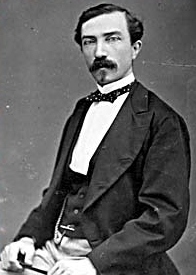Epameinondas Deligeorgis
Epameinondas Deligeorgis | |
|---|---|
 | |
| Born | 10 January 1829 |
| Died | 14 May 1879 (aged 50) |
| Occupation(s) | lawyer, politician |
| Known for | served as Prime Minister of Greece 6 times |
| Father | Dimitrios Deligeorgis |
| Relatives | Leonidas Deligeorgis (brother) |
Epameinondas Deligiorgis (Greek: Επαμεινώνδας Δεληγεώργης, pronounced [epamiˌnonðas ðeliʝiˈorʝis]; 10 January 1829 – 14 May 1879)[1] was a Greek freemason,[2] lawyer and politician - the youngest Prime Minister of Greece, taking office at the age of 36. His parliamentary activity numbered 13 years and he served as Prime Minister of the country 6 times.[3]
He was born in Tripoli, Arcadia, the son of Dimitrios Deligeorgis, a revolutionary and politician from Missolonghi who participated in the Greek War of Independence. Deligiorgis studied law at the University of Athens. He began practicing law in 1850, and in the years that followed became the idol of the liberal "golden youth". He was elected for the first time as an MP of Missolonghi in 1859 and openly opposed the dynasty, which resulted in his being excluded from the Parliament. [4]
He was not a proponent of the Megali Idea (Great Idea) and thought that a better solution to the Eastern Question would be to improve the condition of the Greeks living in Ottoman-controlled Macedonia, Epirus, Thrace and Asia Minor by liberalising the Ottoman Empire.
According to the writer of his biography : Epaminondas Deligeorgis belonged to a new generation of liberal politicians (Golden Youth) who contributed decisively to the liberalization of the country. Militant demonstrations, dense columns (in journalistic publications such as "Panhellenion", "Athena", "Nea Genea"), participation in military postures, fiery speeches in parliament were some of the characteristics of this generation of politicians, who embodied the concept of the "nation in arms", i.e. the combination of nationalism and radical liberalism.[5] He died in Athens, aged 50.
References
[edit]- ^ Note: Greece officially adopted the Gregorian calendar on 16 February 1923 (which became 1 March). All dates prior to that, unless specifically denoted, are Old Style.
- ^ "Δεληγεώργης Επαμεινώνδας".
- ^ "Επαμεινώνδας Δεληγεώργης. O πιο νέος Έλληνας πρωθυπουργός". 12 February 2024.
- ^ https://archive.today/20150525195752/http://www.elia.org.gr/EntryImages%5C1%5C%CE%94%CE%95%CE%9B%CE%97%CE%93%CE%95%CE%A9%CE%A1%CE%93%CE%97,%20%CE%BF%CE%B9%CE%BA%CE%BF%CE%B3%CE%AD%CE%BD%CE%B5%CE%B9%CE%B1.rtf [bare URL]
- ^ "Πανεπιστήμιο και πολιτική: Η περίπτωση του Ε. Δεληγεώργη". 6 June 2022.
Sources
[edit]- Georg Veloudis: "Delijeorjis, Epaminondas", in Biographisches Lexikon zur Geschichte Südosteuropas. Vol. 1. Munich 1974, pp. 385–387.
